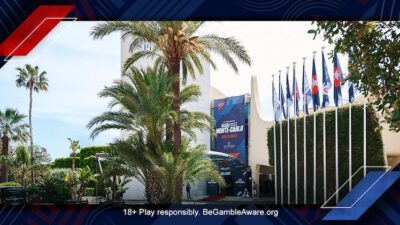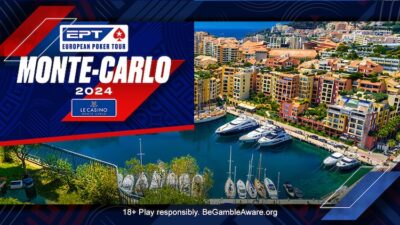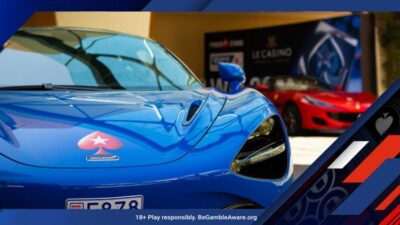The Asia Pacific Poker Tour (APPT) is headed back to the bustling island nation of Macau for a fifth straight year, and the Main Event runs from Nov. 23 through 27. Okay, it’s an isthmus, if you want to be a stickler. In any case, the stunning Grand Lisboa will be hosting the APPT once again this year, and it’ll cost you HKD30,000 to buy a seat directly. If that sounds steep, there are still satellites running on PokerStars, and that’s the best way to win yourself a seat for just pennies on the HKD.
First things first, here’s a look at the schedule of events for the week.
Dinh Le won the inaugural APPT Macau in 2007, and Eddy Sabat topped a huge field of 538 one year later. The Season 3 trophy was stolen away to Ireland by Dermot Blain. Victorino Torres is the defending champion from Season 4, and he went on to have a deep run at EPT Vienna a few months after his win. This time around, the buy-in has been reduced back to HKD30,000 (~$3,860) this year, and all signs point to another huge turnout.
Vitals
Macau is a city of superlatives like no other. It’s the most densely populated country in the world, and its half-million people are crammed into a land area of less than 12 square miles. The country is also the leading gambling mega-center in the world, surpassing Las Vegas a few years ago, and leaving it far in the dust over the last few years. Sin City will earn about $10.3 billion in casino revenue in 2011, but Macau will nearly triple that with more than $28 billion in earnings.
The territory of Macau is a Special Administrative Region of China. Until recently, it was “Macao.” It was the Portuguese who made the city the first European settlement in the East, and they only just returned it to China in 1999 after 400 years of possession. Thanks to that little historical sidestep, Macau is an incredible melting pot of East and West. Street signs are written in both traditional Chinese and Portuguese, and most of the hotel and restaurant staff speak a fair amount of English. Cab drivers are more of a coin flip, though, so it’s best to have the address of your hotel written in Cantonese as a backup. A good bilingual map (or an iPhone app) is never a bad idea, either.
The country has its own currency, the Macanese pataca, but there’s almost no need to use it. Hong Kong Dollars (HKD) are accepted nearly everywhere at a fixed rate of 1:1.03, and most transactions will be easily and graciously handled in HKD. To put it another way, if you only want to bother with one currency, stick with HKD. At the current exchange rate, $1 is worth just less than HK$8.
As far as the weather goes, there’s not much to worry about. While the summertime can be brutally muggy, the winter weather is fantastic in Macau. It’s generally dry — barring a quick, scattered shower — and the moderate temperatures mean you should be comfortable in short sleeves day and night.
One last superlative tidbit: the country boasts the world’s second-highest life expectancy at 84.41 years.
Getting Around
Some flights from within Asia and the Pacific will fly directly into the Macau International Airport, but chances are you’ll be landing at Hong Kong’s behemoth. If it’s your first time in an Asian airport, brace yourself. Hong Kong International Airport transports more cargo than any other airport, moves around 50 million passengers a year(!), and is consistently ranked among the best airports in the world. Lucky for you, it’s pretty easy to get around.
The best way to get from HKIA to Macau is aboard one of the powerful catamaran ferries run by TurboJet. The check-in desk is located right in the airport on Level 5 (in Transfer Area E2), and the transfer allows you to bypass Hong Kong Immigration on both the arrival and the return trips. It’s hard to put a value on a perk like that, but TurboJet has done it. Tickets can be had for HK$233 (about $30), and if you splurge for the HK$362 (about $50) Super Class ticket, you’ll get a cozier cabin, some extra leg room, a little snack, and one more priceless advantage: disembarking first to beat the rush to immigration. The boat ride takes just about an hour in calm seas, and it’s available from 10 a.m. to 10 p.m.
Go ahead and buy a ticket ahead of time here to save yourself one more step in Hong Kong.
You’ll clear customs and immigration once you step off the boat, and then it’s straight into Macau. Most of the major hotels have shuttle busses at the ferry terminal, and some of them can be rather nice. Follow the masses out to the left of the terminal and you’ll see the shuttles all lined up and waiting. If you spot a clunker with your hotel’s name on it, you can grab a taxi for around $30, depending on where you’re going. If you’re lucky enough to fly straight into Macau International, you should probably just keep life easy and fork over the extra few bucks for the taxi. It’ll generally run you about $50 to $60 with all the surcharges, but it’ll put you and your bags right on the doorstep of your hotel with minimal stress. The public transportation is plentiful but preposterous in Macau.
Once you’ve set up shop in your hotel, you won’t be far from where you want to go. There’s only 12 square miles of land, after all.
Staying Put
If you can muster it, staying in the Grand Lisboa is quite a luxury. There are two televisions in the bathroom, for starters. Do you really need any more convincing than that? One of those TVs is hidden transparently inside the mirror. The rooms have a shower/sauna, electric everything, and the most amazing bath robes. We could talk about the bathroom for hours, but the best perk of staying there is you’ll never get lost on the way home at night. There are plenty of big buildings in Macau, but none of them are as noticeable as the enormous flashing neon lotus flower sticking out of the Grand Lisboa lobby. There are also ample food choices within the hotel and casino; the noodle kitchen is utterly fantastic.
Now is probably a bad time to let you know that rooms are scarce at the Grand Lisboa. Fortunately, though, APPT Hotels has done a good job of putting together some other choices. The Mandarin Oriental will probably be your next choice, but there are plenty of cheaper options available, as well. Don’t be afraid to venture south to Cotai and look into options like the Four Seasons or the Galaxy Macau. All of those properties will handle the needs of the discerning poker player with amenities like WI-FI, 24-hour room service, and free shuttle service.
Out and About
With its unique history, Macau is truly a one-of-a-kind country that blends bits of colonial Europe and traditional China together seamlessly. Make sure you take the time to channel your inner nomad and wander the streets for at least a couple hours. The old, cobbled pavements are narrow and hilly, and the crowds on the sidewalks can be too thick to see through. Still, it’s well worth a hike around just to scope out the myriad of shops, temples, statues, landmarks, and other little bits of historical paraphernalia. It’s a country brimming with culture. One thing you’ll certainly want to see is St. Paul’s Cathedral — or what’s left of it. One of the country’s most famous landmarks, the church was destroyed by a typhoon and a fire in 1835, and all that’s left is the front facade and a great photo/postcard opportunity.
It’s not all religion, though, and there is some debauchery to be found, too. If the tournament hasn’t gotten all the gamble out of you, there are plenty of casinos around that can do the trick. Catch a cab across the bridge and feast your eyes on the Cotai Strip, the fastest growing casino complex in the world. With names like the Venetian, MGM, and Wynn, you could be forgiven for thinking you were in Las Vegas for a moment. Not even close. The Macau version of the Venetian is the biggest casino you’re ever likely to see, and at 10.5 million square feet, it’s the sixth largest building — in the world. Also worth a look is the City of Dreams across the street where you can find some quirky cocktails and a one-of-a-kind show in the Dancing Water Theater.
Really anywhere you go in Macau, you’re bound to find something worth talking about. So good luck in the tournament, but don’t forget to take time to explore that little unique corner of Asia while you’re there.
Back to Top






